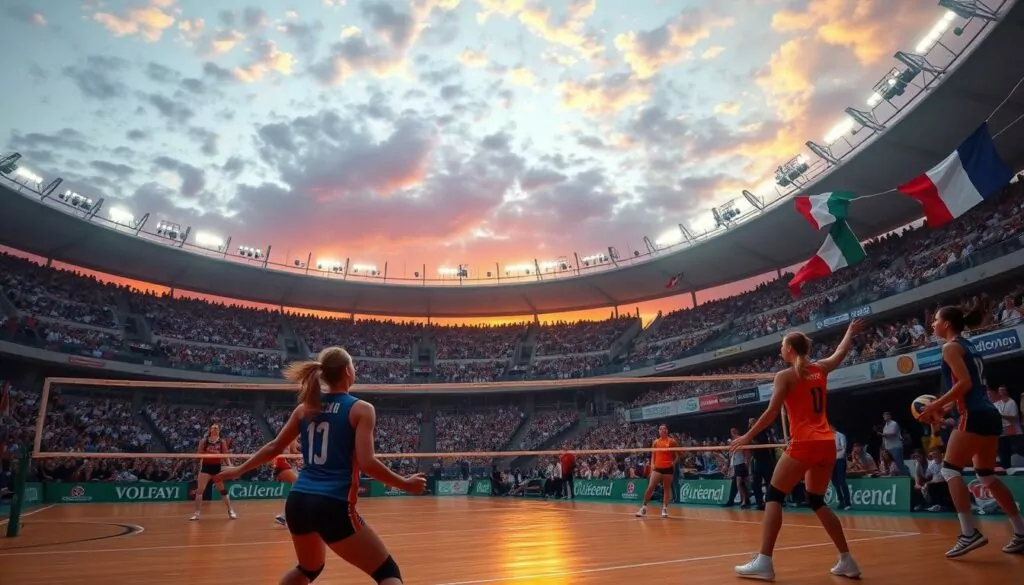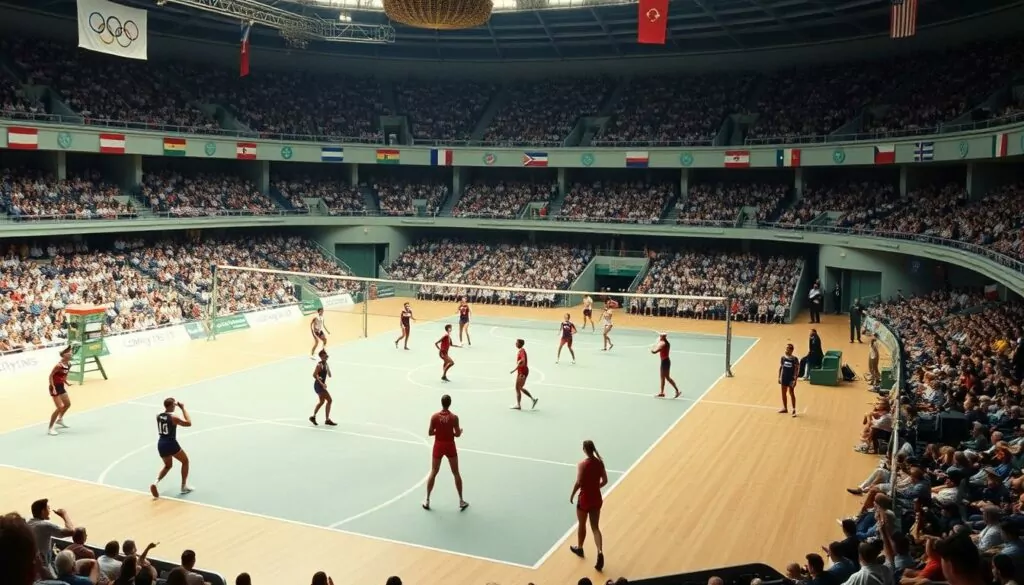Volleyball’s championship tournaments have a fascinating history. From European competitions to global spectacles, the sport’s rise is captivating. Let’s uncover the key moments that shaped this dynamic game.
My volleyball journey began in childhood. I spent countless hours practicing, dreaming of competing globally. As I grew, I became curious about the championships’ origins.
How did these events evolve into worldwide phenomena? What were their humble beginnings? These questions fueled my exploration of volleyball’s rich past.
We’ll trace volleyball championships from their early days to modern times. We’ll explore European tournaments and the FIVB’s formation. The rise of professional volleyball will also be a key topic.
Key Takeaways
- Volleyball championships have a rich and storied history, dating back to the early 20th century.
- The sport’s global popularity has led to the development of prestigious international tournaments and the establishment of governing bodies like the FIVB.
- The transition from amateur to professional volleyball has transformed the championship landscape, with athletes reaching new heights of skill and competition.
- Landmark events, such as the Olympic Games, have played a crucial role in shaping the history and legacy of volleyball championships.
- Legendary teams and players have left an indelible mark on the sport, inspiring generations of athletes and fans alike.
The Birth of International Volleyball Championships

Global volleyball championships began with early European tournaments. These events set the stage for the World Championships, the pinnacle of international volleyball competition.
Early European Tournaments Development
Official international volleyball tournaments emerged in Europe during the 1920s. Italy, France, and Czechoslovakia led these early competitions. These regional events fostered a competitive spirit and set the stage for global championships.
First World Championship Events
The first volleyball world championships took place in 1949 in Prague, Czechoslovakia. This historic event brought together national teams from around the world. It laid the groundwork for future volleyball milestone events.
Establishment of FIVB Standards
The Fédération Internationale de Volleyball (FIVB) was founded in 1947. It standardized rules and regulations for the sport. This ensured fair play in volleyball world championships and other global competitions.
The birth of international volleyball championships showcased the sport’s growing popularity. It highlighted the dedication of the global volleyball community. These early tournaments and the FIVB’s creation shaped today’s exciting volleyball world championships.
Volleyball Championships History: From Amateur to Professional Era
Volleyball championships have evolved from amateur events to global professional competitions. This journey has been marked by growing popularity and increasing stakes. The sport’s transition has captivated audiences worldwide.
Initially, volleyball was mainly an amateur sport with local tournaments. As its appeal grew, the need for structured championship events became clear. This led to the creation of more prestigious competitions.
The introduction of prize money changed volleyball championships forever. Athletes could now focus solely on the game. This led to higher skill levels and more strategic play.
The sport’s history includes early European tournaments and the FIVB’s establishment. The creation of World Championships further solidified volleyball’s global status. These events showcase the sport’s ability to adapt and grow.
Today, volleyball title events are major spectacles watched by millions. Championship winners are celebrated as heroes in the sport’s history. These events display the highest levels of athletic prowess.
The future of volleyball championships looks bright and exciting. New innovations may emerge in the coming years. Rising stars will shape the sport’s legacy for future generations.
Olympic Volleyball: Golden Moments and Milestone Events

The Olympic Games showcase the best in volleyball. Unforgettable finals and dominant team dynasties highlight the sport’s pinnacle. These events have shaped volleyball olympic history and created volleyball historical moments.
Memorable Olympic Finals
The 1988 men’s final between the Soviet Union and Brazil was iconic. The Soviets won in five sets, proving their dominance.
In 2012, the U.S. women’s team claimed their first Olympic gold. They defeated Brazil in a dramatic final match.
Team Dynasty Stories
- The Cuban women’s team won three straight golds from 1992 to 2000.
- Brazil’s men’s team claimed gold in 2004, 2016, and 2020.
- The Russian women’s team has won multiple Olympic titles over decades.
Revolutionary Rule Changes
Rule changes have transformed Olympic volleyball. In 1999, the rally point system replaced side-out scoring.
Beach volleyball became an Olympic sport in 1996. It’s now a popular part of the Games.
Volleyball olympic history is full of captivating stories and unforgettable performances. Volleyball historical moments continue to shape the sport we love. The Olympic Games promise more thrilling chapters in volleyball’s future.
Legendary Teams and Players That Shaped Championship History

The volleyball hall of fame honors amazing athletes and teams who changed the sport. These volleyball legends have inspired fans worldwide with their incredible achievements.
The Soviet Union women’s volleyball team ruled the 1960s and 1970s. Led by Inna Ryskal, they won three Olympic golds and many World Championships. Their success made them one of the best teams ever.
The Cuban men’s team has been a powerhouse for years. Players like Sergio Ramírez and Wilfredo León are true volleyball legends. Their skills and determination have set them apart.
Individual stars have also made their mark. Karch Kiraly, Fei Tong, and Danielle Scott-Arruda are icons of excellence. Their achievements have inspired generations of volleyball players globally.
“These athletes have not only dominated the court but have also served as role models, inspiring countless young people to pursue their dreams in the sport.”
The volleyball hall of fame keeps growing with new legends. These teams and players will continue to shape competitive volleyball for years to come.
Conclusion
Volleyball championships have undergone a remarkable transformation over time. The sport has evolved from an amateur pastime to a globally celebrated professional spectacle. Volleyball now holds a unique place in international sports.
Early European tournaments laid the foundation for competitive volleyball. The establishment of FIVB and World Championships marked important milestones. The transition to professional play has elevated the sport’s level and showcased exceptional athleticism.
Olympic Games have been crucial in shaping volleyball’s legacy. They’ve provided a stage for some of the sport’s most iconic moments. Legendary teams and players have left an indelible mark on volleyball history.
The sport continues to evolve with rule changes and technological advancements. These developments push the boundaries of what’s possible in volleyball. The future of volleyball championships promises to be dynamic and captivating.
